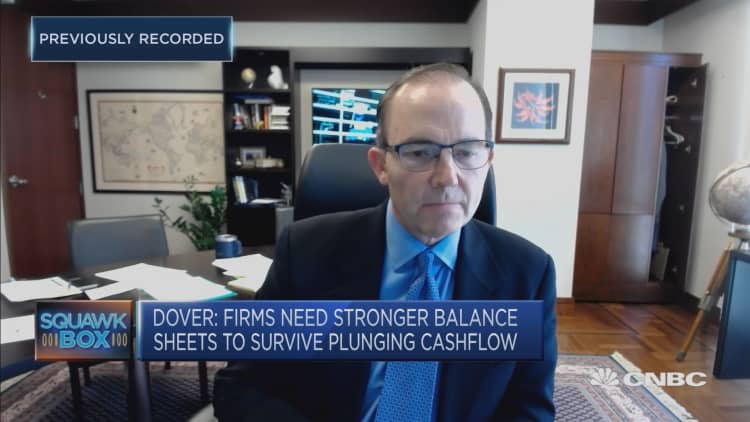European equities are better positioned than their U.S. counterparts for a prospective recovery from the coronavirus downturn, according to Barclays.
In a research note Wednesday, the British bank said it was "overweight" European equities versus U.S. equities, reflecting a belief that despite a rocky run of late, European stocks were now good value and expected to outperform during a potential six- to 12-month recovery.
Despite suffering their worst first quarter on record, U.S. stocks have benefited from their relative safe-haven status year-to-date, but could see their global leadership challenged in the wake of the coronavirus pandemic, Barclays strategists suggested.
"The COVID-19 outbreak in the U.S. has caught up with Europe, and despite sizable fiscal stimulus, the welfare system in the U.S. might provide less cushion to the private sector compared to Europe," Barclays Head of European Equity Strategy Emmanuel Cau said.

While the U.S. has sought to encourage firms to retain employees by offering tax credits, they have not implemented the sweeping payroll subsidies seen in major economies across Europe, such as Germany and France.These subsidies encourage "labor hoarding" and reduce the likelihood of near-term job losses during the crisis, leading economists to project considerably sharper unemployment spikes in the U.S. than in Europe.
European equities have underperformed the U.S. so far this year, which Cau and his team attributed both to weaker economic and fiscal fundamentals in the region's major economies, and to their increased volatility in relation to the rest of the market.
Over the year to date, Europe's STOXX 600 is down around 20.46%, whereas the U.S.' S&P 500 is close to 15% lower.
Tech, buybacks and oil
"Weak domestic growth, declining banks profitability, lack of tech, over-reliance on the 'old economy', messy politics and trade exposure have turned Europe into a consensus underweight for while, but its depressed relative valuations to the U.S. and bearish positioning seem to be pricing in a lot already," Cau outlined in the note.
While Europe's "old economy" is dominated by financials, industrials, materials and staples, the U.S. is more reliant on a small basket of high profile tech stocks, namely the FAANGS, rendering it less diversified and meaning a broad recovery could be more difficult.
"The growth/quality nature of the U.S. equity market remains a structural advantage vs. Europe, but the end of the buybacks super-cycle and the collapse in oil prices could be more problematic for the former," Cau added, suggesting that Europe offers a "cheap" option on a potential six to 12-month recovery timeline.
Share buybacks — when a company buys back its own stock — were particularly strong in 2018, following the implementation of corporate tax cuts by U.S. President Donald Trump's administration, but have since moderated, which Barclays suggested reduces Europe's disadvantage.
Share buybacks boost the value of a company's stock and improve its financial statements, which tends to drive further investment. With U.S. buybacks cooling off and limits in place for American companies taking government loans, their advantage over European diminishes in this regard.

Meanwhile, oil prices have collapsed in recent weeks on account of a potential price war between powerhouse producers Russia and Saudi Arabia, which arose out of a dispute over production cuts. Falling oil prices have a far greater impact on the U.S. as the world's largest oil and gas producer, with U.S. shale expected to be the first casualty of a full blown price war.
Barclays analysts have allocated more capital to core European markets such as France and Germany, based on their stronger fiscal position, than the likes of Spain and Italy, whose equity markets are less diversified and heavily skewed towards financials.
A further boost may come from a weakening euro, Cau also highlighted, which could aid European exporters, particularly automakers and luxury goods manufacturers, as their products will be cheaper for foreign buyers to purchase.

